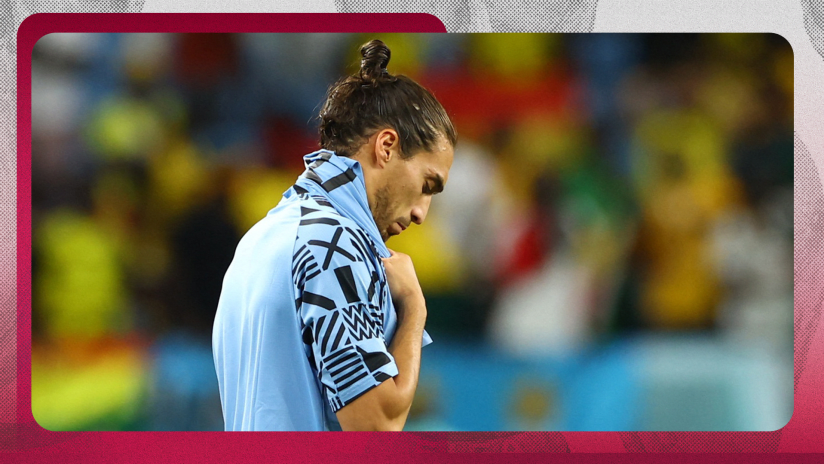Group H went down to the wire Friday at the 2022 FIFA World Cup.
South Korea advanced to the knockout stage in second place, while Uruguay exited in third place despite winning on the final matchday. Portugal were already through and claimed first place despite losing.
How did it all go down? What was the deciding factor? How do the tiebreakers work?
Here are the final Group H results, followed by the standings.
Team | Points | Record | Goals (for, against, GD) |
|---|---|---|---|
1. Portugal | 6 | 2W-1L-0D | 6; 4; +2 |
2. South Korea | 4 | 1W-1L-1D | 4; 4; 0 |
3. Uruguay | 4 | 1W-1L-1D | 2; 2; 0 |
4. Ghana | 3 | 1W-2L-0D | 5; 7; -2 |
World Cup group standings tiebreakers
- Points
- Goal differential
- Goals scored
- Head-to-head result
- Goal differential in matches between tied teams (only in three-way tie)
- Goals scored in matches between tied teams (only in three-way tie)
- Fair play tiebreaker (based on negative points for yellow and red cards)
- Drawing lots
Uruguay were on four points, as were South Korea after their win. They were tied on the second tiebreaker (goal differential) at a dead-even zero.
That stalemate put the third tiebreaker (goals scored) into play. South Korea scored four times in Group H, while Uruguay had just two goals in the whole tournament.
What made the difference?
The deciding factor, at least on Friday, was Hwang Hee-chan scoring in the 91st minute for South Korea to upset Portugal, 2-1.
Uruguay were up 2-0 on the Ghanaians after a first-half brace from Giorgian de Arrascaeta. But a win wasn’t enough in a highly-billed rematch from the 2010 World Cup quarterfinals, when Luis Suarez’s infamous handball helped deny the Black Stars.
Had the Portuguese defense held firm, or if they scored beyond Ricardo Horta’s fifth-minute tally, then it’d be a conversion of Uruguay advancing on points. But the dice rolled in a different direction, and Uruguay were left kicking themselves for gathering just one point before Friday.
MLS connections
Despite winning, Uruguay’s two MLS representatives – LA Galaxy defender Martin Caceres and Orlando City SC winger Facundo Torres – had an earlier-than-expected World Cup stay. They were led by former Inter Miami CF head coach Diego Alonso.
Uruguay, two-time World Cup champions, were ranked No. 14 in FIFA’s World Rankings. And they made the 2010 semifinals and 2018 quarterfinals, fully capable of advancing far in Qatar.
Instead, a golden generation that’s spearheaded by Suarez and striker partner Edinson Cavani sees their glorious international careers wind down. Caceres, age 35, is part of that group and was at his fourth World Cup.
Torres, 22, is part of Uruguay’s new generation.











